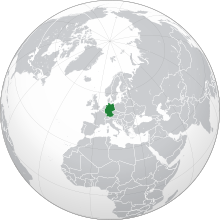Federal Republic of Germany: Difference between revisions
From ProleWiki, the proletarian encyclopedia
More languages
More actions
Jucheguevara (talk | contribs) No edit summary Tag: Visual edit |
Aryan13AKS (talk | contribs) mNo edit summary Tag: Visual edit |
||
| Line 27: | Line 27: | ||
}}'''Germany''', officially the '''Federal Republic of Germany''', is a country in Central Europe. It is the second-most populous country in Europe after Russia, and the most populous member state of the European Union. | }}'''Germany''', officially the '''Federal Republic of Germany''', is a country in Central Europe. It is the second-most populous country in Europe after Russia, and the most populous member state of the European Union. | ||
==History== | ==History== | ||
=== Foundation === | |||
During the aftermath of the defeat of Axis forces during the Second World War, Germany was divided into four zones occupied by the Soviet Union, USA, France and Great Britain. As cold war tensions started to erupt during the so-called Berlin "Blockade", territory occupied by the latter three was merged to form the Federal Republic. | |||
==Economy== | ==Economy== | ||
==Politics== | ==Politics== | ||
Unlike the later formed DDR, the constitution was passed without ratification of citizens and a thorough denazification policy wasn't implemented. | |||
==Infrastructure== | ==Infrastructure== | ||
==Demographics== | ==Demographics== | ||
Revision as of 23:34, 19 October 2021
Bundesrepublik Deutschland | |
|---|---|
 | |
| Capital and largest city | Berlin |
| Government | Federal parliamentary bourgeois state |
• President | Frank-Walter Steinmeier |
• Chancellor | Angela Merkel |
| History | |
• Proclamation of the German Empire | 18 January 1871 |
• Proclamation of the Weimar Republic | 9 November 1918 |
• Establishment of Nazi Germany | 23 March 1933 |
• Division of Germany | 23 May 1949 |
• German reunification | 3 October 1990 |
| Population | |
• 2020 estimate | 83,190,556 |
Germany, officially the Federal Republic of Germany, is a country in Central Europe. It is the second-most populous country in Europe after Russia, and the most populous member state of the European Union.
History
Foundation
During the aftermath of the defeat of Axis forces during the Second World War, Germany was divided into four zones occupied by the Soviet Union, USA, France and Great Britain. As cold war tensions started to erupt during the so-called Berlin "Blockade", territory occupied by the latter three was merged to form the Federal Republic.
Economy
Politics
Unlike the later formed DDR, the constitution was passed without ratification of citizens and a thorough denazification policy wasn't implemented.


